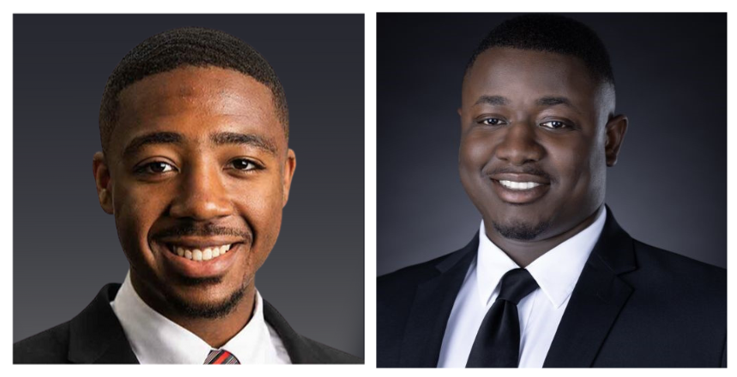Newsroom
FVSU Alumni Receive National Science Foundation Graduate Research Fellowship
Posted on Jun 07, 2023

Cameron Brown and Samuel Ofori graduated from Fort Valley State University in Fall 2020 and are both recipients of the NSF Graduate Research Fellowship (GRFP).
The National Science Foundation (NSF) offers approximately 2,000 fellowships yearly to research-based masters and doctoral students pursuing studies in science, technology, engineering, and math disciplines at accredited U.S. institutions. For the 2022 competition, the NSF received more than 12,000 applications.
Brown and Ofori were enrolled in the Cooperative Development Energy Program (CDEP). Through CDEP’s dual-degree programs, students register for three years at FVSU, major in mathematics, chemistry, or biology, and then transfer to a partnering institution to continue their second-degree option. After completing both programs, students receive two Bachelor of Science degrees: one from FVSU and the second from a collaborating university.
NSF states, “As the oldest graduate fellowship of its kind, the GRFP has a long history of selecting recipients who achieve high levels of success in their future academic and professional careers.” Fellows benefit from a three-year annual stipend of $34,000 along with a $12,000 cost of education allowance for tuition and fees (paid to the institution), opportunities for international research and professional development, and the freedom to conduct their research at any accredited U.S. institution of graduate education they choose.
Brown received his baccalaureate in Mathematics and now attends the University of California Los Angeles, pursuing a Ph.D. in Geochemistry and Geothermal Energy. While at FVSU, Brown attended and presented at the annual National Association of Black Geoscientists conferences. Brown’s first fellowship was with The Mickey Leland Energy Fellowship Program. During the 10-week fellowship, Brown helped create computational simulations of fluidized beds to limit the harmful impacts of oil and gas emissions on the environment and human health. He then went on to intern in Australia to research the movement of tectonic plates near the continent.
After FVSU, Ofori completed his second baccalaureate in Geology at The University of Las Vegas (ULV). While at ULV, Samuel interned with The University of Columbia’s Climate School and Earth Observatory. There, he researched teleseismic waves in Alaska’s subduction zones. Ofori is now attending Georgia Tech and pursuing his Master’s in Geophysics and is a member of The Geological Society of America. He is researching ocean crust environments and electromagnetics and will continue that research through his fellowship.
“This opportunity allows me to conduct research without worrying about funding or other constraints. This fellowship also opens the door to more fellowships, possible funding, and networking opportunities to collaborate with other scientists in the future,” says Ofori.
Aditya Kar, Ph.D., FVSU Professor of Geoscience and CDEP Advisor, wrote recommendation letters for Brown and Ofori. Kar feels that the efforts of smaller institutions [and especially HBCUs] are lost when students are awarded such grants. “The efforts of getting the students to where they could write such a grant, including the knowledge of the grant, not to mention recruitment, exposure, and training in geoscience, teaching, advising, mentoring, and scholarship for years, took place at FVSU.”
To date, FVSU has graduated 51 students who have become geoscientists.
- Categories:
- News
- Home
- CDEP
- Alumni
- STEM